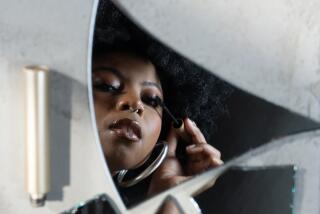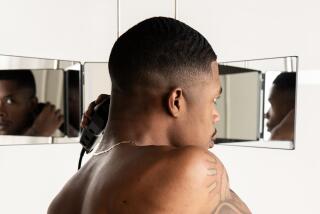CHANGE -- IT’S IN THE HAIR
- Share via
Hair is nothing if not a powerful subject for African Americans.
In Chris Rock’s new documentary “Good Hair,” which opened Friday, he sets out to explore the complexities of living with black hair. He visits beauty salons, hairstyling competitions, science labs and Indian temples. He interviews a cavalcade of celebrities, salon owners and their clients in multiple cities.
Through the ages, people of all ethnicities have obsessed about hair. Ancient Romans, Assyrians, Greeks and Egyptians wore wigs; so did Marie Antoinette and Thomas Jefferson. Jessica Simpson, Britney Spears and Paris Hilton have used weaves or hair extensions.
But the movie probes the exhaustive amount of time and expense the African American community at large -- not just celebrities -- spends on hair.
One wonders: in this era, when the definition of beauty has broadened to include women of all races, and when fame, power and money are accessible to people of color as never before, is hair really this important? Well, yes: industry statistics show that 30% to 34% of all hair products in the U.S. are purchased by African American women. And the film contends that hair weaves -- worn by women of all ethnicities but especially notable among black women -- make up about 65% of hair-care revenue.
So if you’re African American, are feelings about your natural hair and your willingness -- or unwillingness -- to wear it naturally always a litmus test of ethnic pride? Or is hair just a fun accessory to play with, no matter the color of your skin?
The questions come from a complicated past and are rooted in an African hair culture rich with history.
Ayana D. Byrd and Lori L. Tharps wrote the 2001 book “Hair Story: Untangling the Roots of Black Hair in America,” in which they put African Americans’ complex feelings about hair into context.
“The terms ‘good hair’ and ‘bad hair’ came out of slavery,” Tharps says. “The closer your hair was to white European hair, the more likely that it was that you had white blood in you. That meant that you would have more access to better food, better education, preferential treatment and be more likely to be set free -- so literally good hair meant a better chance at life. It wasn’t about beauty at all; it was about survival.”
But African American hair culture reaches back much further. “In 15th century Africa, hair was loved and adorned, and it was so significant because hair indicated your social status, what family you belonged to, even your profession. The more elaborate your hairstyles, the higher you were in society and more power you had,” Tharps says. “Hair was also significant because it’s the highest part of your body. So it was considered the closest thing to the gods. Many people believed that the gods communicated through your hair.”
Elaborate styles such as those showcased in the film at the 60-year-old Bronner Bros. International Hair Show are a continuation and celebration of African tradition. “Women using weaves, color and a hair piece here and there -- that’s been part of our cultural heritage,” Tharps says.
Some of the African Americans whom Rock interviewed felt that natural hair isn’t “professional” looking -- despite the many beautiful, successful women wearing natural hair now, such as “Cold Case” actress Tracie Thoms, who is interviewed in the film and asks, “To keep my hair the same texture as it grows out of my head is looked at as revolutionary -- why is that?”
Still, natural hair styles seem to be booming. Tyra Banks, for one, recently removed her weave and “she looks even more beautiful,” Rock said in an interview.
Marlita Meyers, a case manager in Chicago, went all natural about nine years ago and has rope-like strands known as locs to her mid-back. “When I first decided to grow locs, people would stare and point. But the world has changed since then,” Meyers says. For work she coifs her locs in more conservative styles such as up-dos or ties it back, but she says, “I’ll have locs for the rest of my life. You can love yourself with your natural hair.”
Joyce Brown, who owns Soul Salon Spa in the historic Bronzeville neighborhood of Chicago, went natural in early 1998, before getting pregnant. “You have to think, ‘OK how will this impact my child that I’m carrying?’ ” she says of the chemicals used to relax hair.
“For our clientele, going natural is less of a political statement and more of a health-related thing, with natural products becoming more prominent,” she says.
But extensions and weaves are still popular, though they are time-consuming and expensive. Kim Kimble, the founder of Kimble Hair Studio in Los Angeles and Kimble Haircare, serves a high-end clientele including doctors, lawyers, producers and trend-setting celebrities, such as Beyonce, Mary J. Blige and Shakira. “At our salon, 90% of our clients wear extensions,” Kimble says. “That’s what we’re known for.” She says that in Los Angeles and New York, extensions are especially popular. They can create a “beautiful [soft] look,” and can protect natural hair from the damaging effects of relaxers and heat styling.
“Today, no one has to be put into a box,” Kimble says. “You can be nurturing and natural, edgy and rocker, or glamorous like Beyonce. . . . Good hair is healthy hair.”
--
More to Read
Only good movies
Get the Indie Focus newsletter, Mark Olsen's weekly guide to the world of cinema.
You may occasionally receive promotional content from the Los Angeles Times.










